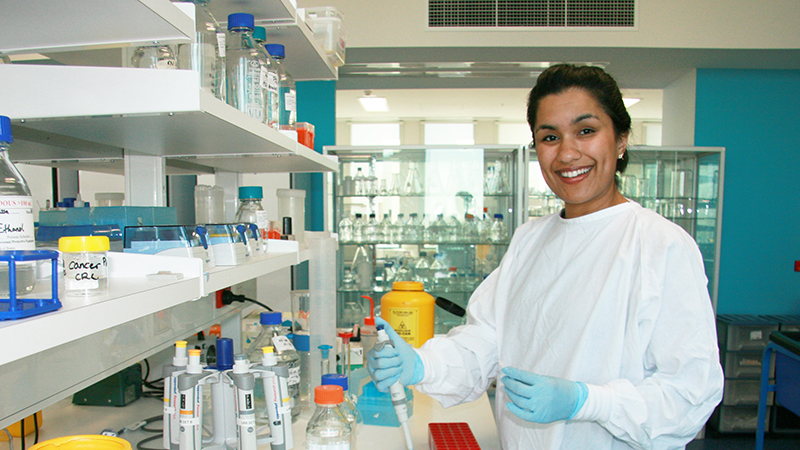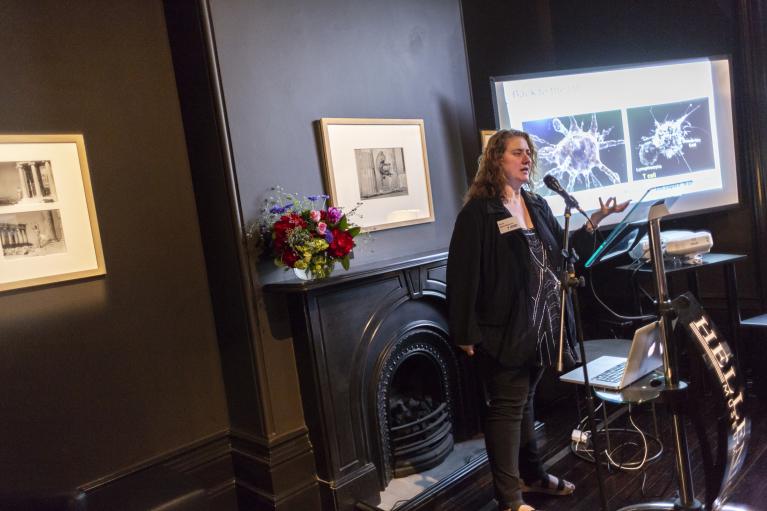Cancer, Autoimmunity, Immunology
Part of VU's Mechanisms and Interventions in Health and Disease group, the Cancer, Autoimmunity, Immunology focus area has the subgroups Cancer Biology and Metastasis, Enteric Neuropathy, Immunology and Translational.

Cancer Biology & Metastasis
Cancer is the leading disease burden in Australia.
The primary cause of cancer death and mortality is the spread of the cancer to secondary sites/organs, a process termed 'metastasis'. Knowledge of the molecular mechanisms of metastasis is limited, and current therapies are ineffective. No cure for metastatic cancer exists.
Disease/dysfunction areas:
- breast
- renal
- melanoma
- prostate
- lung cancers.
Aims
The overarching aims for the group are:
- to define essential molecular mediators and mechanisms of metastasis
- to identify and/or design drugs to block the actions of these molecules, upon which metastatic cancer cells rely for their activity, growth and survival.
Our expertise
We use combined expertise in the following areas:
- advanced animal imaging approaches
- biomarker discovery in cancer patient materials
- cell and molecular biology
- gene expression/bioinformatics analysis
- in vivo models of metastasis
- peptide-based drug design
- protein biochemistry.
Our team
Staff
- Professor John Price, Group Leader
- Dr Craig Goodman
- Dr Elizabeth Verghese
- Valentina Jovanovska
Research students
- Jack Bolton
- Tabitha Creek
- Charlett Giuliani
- Joseph Polidano

Enteric Neuropathy
The Enteric Neuropathy group focuses on the development of new therapies for enteric neuropathy associated with inflammatory bowel disease, colorectal cancer, and side-effects of anti-cancer chemotherapy.
Mental-health research associated with the gut–brain axis is also a focus of the group.
The research philosophy is to translate scientific discoveries of basic science research (bench) into novel therapies for human disease (bedside).
Disease/dysfunction areas:
- inflammatory bowel disease
- inflammation induced cancer
- mental health
- colorectal cancer
- inflammation induced osteosarcopenia.
Research topics
Our research involves a range of topics, including:
- enteric neuropathy as a target to alleviate gastrointestinal side-effects of chemotherapy
- inflammation-induced cancer: mechanisms and novel treatments
- inflammation-induced osteosarcopenia: mechanisms and novel treatments
- inflammatory bowel disease: novel molecular targets for development of effective therapies
- mesenchymal stem cell-based therapies for inflammatory bowel disease and coloctoral cancer
- methamphetamine-induced depression: mechanisms and novel treatments
- role of the nervous system in cancer development and progression.
Our team
Staff
- Associate Professor Kulmira Nurgali, Group Leader
- Professor Vasso Apostolopoulos
- Dr Sarah Fraser
- Majid Hassanzadeganroudsari
- Dr Samy Sakkal
- Dr Xiao Su
Research students
- Elizabeth Donald
- Jack Feehan
- Rhiannon Filippone
- Swati Garg
- Elif Kadife
- Abilasha Gayani Jayathilake
- Ramya Juyothi
- Marco Papageorgiou
- Ainsley Robinson
- Rhian Gordon Stavely
- Shilpa Sharm
Immunology & Translational Research
The immune system plays a major role in health and disease. Understanding the cellular, molecular and functional changes to the immune system in chronic diseases will lead to their prevention, treatment and management strategies.
As well as researching immune-system changes, our group is involved in drug design and vaccine formulations for chronic diseases – in pre-clinical models, clinical research and translational focus.
Disease/dysfunction areas:
- cancer
- autoimmunity
- metabolic disorders
- mental health
Our expertise
Although our core discipline is immunology, we have a multi-disciplinary focus that includes:
- biochemistry
- bioinformatics
- cell biology
- clinical research
- drug development
- exercise immunology
- medicinal chemistry
- molecular biology
- nutrition research
- structural biology (crystallography, NMR, molecular modelling)
- translational research.
Our team
Staff
- Professor Vasso Apostolopoulos, Group Leader
- Dr Fatah Atesh
- Dr Michelle Ball
- Professor Maximilian de Courten
- Dr Sarah Fraser
- Majid Hassanzadeganroudsari
- Dr Maja Husanic
- Joshua Johnson
- Dr Jim Kiatos
- Associate Professor Kulmira Nurgali
- Professor Alex Parker
- Dr Samy Sakkal
- Professor Lily Stojanovska (Emeritus)
- Dr Kathy Tangalakis
- Professor Todor Vasiljevic
- Dr Anthony Zulli
Research students
- Maria Adamopoulou
- Christopher Apostolou
- Narges Dargahi
- Elizabeth Donald
- Jack Feehan
- Rhian non Filiponne
- Swati Garg
- Manpreet Grewal
- Ram ya Sindhoora Juyothi
- Antonio Lagana
- Kathleen Mikkelsen
- Marco Papageorgou
- Supa Pudkasam
- Tawar Qaradakhi
- Kristina Vingrys
